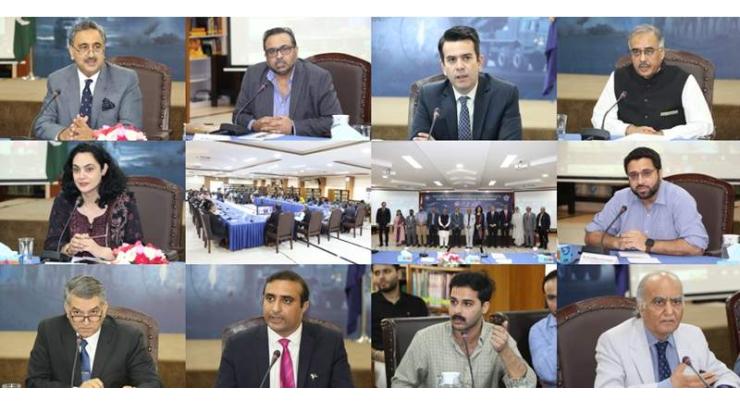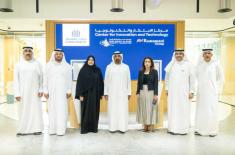
ISSI, Mishal Host Seminar On "Civilian Protection In Multidomain Conflicts"
Fahad Shabbir (@FahadShabbir) Published September 10, 2025 | 07:31 PM

The India Study Centre (ISC) at the Institute of Strategic Studies Islamabad (ISSI), in collaboration with Mishal Pakistan, hosted a Seminar, titled “Civilian Protection in Multidomain Conflicts: Legal and Humanitarian Perspectives on Operation Sindoor”
ISLAMABAD, (UrduPoint / Pakistan Point News - 10th Sep, 2025) The India Study Centre (ISC) at the Institute of Strategic Studies Islamabad (ISSI), in collaboration with Mishal Pakistan, hosted a Seminar, titled “Civilian Protection in Multidomain Conflicts: Legal and Humanitarian Perspectives on Operation Sindoor.”
Ahmer Bilal Soofi, prominent International Law expert and Pakistan’s former Minister of Law, Justice, Parliamentary Affairs, and Human Rights, graced the occasion as the Guest of Honour, said a press release issued on Wednesday.
Speakers included Rehman Azhar, renowned journalist and Executive Director of Centre for Law and Security (CLAS); Dr. Marium Fatima, Assistant Professor, National Defense University (NDU); Muhammad Oves Anwar, Director, Research Society of International Law (RSIL); and Amir Jahangir, CEO, Mishal Pakistan.
In his remarks, Ambassador Sohail Mahmood said that India used the recent Pahalgam attack as a pretext not only to launch completely unjustified and reckless military aggression on Pakistan, but also expected the world to accept its false narrative and bellicose intentions against Islamabad without providing even a shred of evidence. In contrast, the international community saw Pakistan’s offer for a transparent, credible, and neutral international investigation into the matter as reasonable and a way to prevent serious threat to international peace and security.
Ambassador Sohail Mahmood noted that under the so-called ‘Operation Sindoor,’ India struck civilian areas in Pakistan and AJK -- including residential neighborhoods, Mosques, and essential services, resulting in 40 deaths, including those of children and women.
These actions were in clear violation of international humanitarian law and relevant resolutions of the UN Security Council, beside breaching the time-tested principles of inter-state relations. The laws being violated by New Delhi during the course of ‘Operation Sindoor’ include Article 51 of the Additional Protocol of the Geneva Conventions of 1949, and UNSC’s foundational resolution S/RES/1265 (1999) on protection of civilians in the armed conflict.
Ambassador Sohail Mahmood emphasized that Indian action of May 2025 must be seen as a continuum and part of a trajectory of serial abuses of human rights in IIOJK. Together, they represent not episodic misconduct, but a pattern of unremitting hostility and aggressive behavior on India’s part. This linkage emphasizes how vital it is to see violations in one domain leading to excesses in another – rather than treating each catastrophe as an isolated occurrence.
In his remarks, Ahmer Bilal Soofi presented a broad spectrum of international law and highlighted its interaction with political decision-making. He observed that while international law provides essential principles, political leaders at times prioritize their strategic preferences, which can overshadow legal imperatives. This, he explained, stems from the broader worldviews of states, making international law appear secondary in moments of political urgency.
Soofi emphasized the need for effective mechanisms to address atrocities against civilian in conflict zones. Strengthening mechanisms for legal documentation, he stressed, is vital for ensuring that evidence of civilian atrocities is preserved and presented effectively before international forums. Among other things, he observed, a Tribunal dedicated to investigating harm to civilians resulting from Indian action during the May 2025 conflict could be one legal recourse.
He further underscored the importance of analyzing key issues within their proper context to avoid oversimplification and misrepresentation.
Concluding his remarks, Soofi asserted that the issue of civilian killings in IIOJK should be addressed through legal and international channels, offering a structured pathway toward justice.
Earlier, Dr. Khurram Abbas in his introductory remarks noted that despite extensive analytical, academic, and media reporting of the May 2025 crisis, due attention had not been paid to civilian casualties that the crisis inflicted. While the crisis has unveiled new dimensions of South Asia’s strategic stability and conflict management capabilities of the global powers, legal and humanitarian costs of the conflict must not be overlooked. Amir Jahangir emphasized that academic and practitioner insights can lead to bilateral arrangement to prevent or minimize civilian sorrows in the course of any future conflict.
Dr. Talat Shabbir noted that the tragedy of Operation Sindoor has underscored the grim reality of how civilians often bear the brunt of military conflict in which the attacker is not caring about the civilian casualties on ground. Beyond conventional battlefields, multidomain conflicts—spanning land, air, cyber, and information spheres—create new complexities for civilian safety. The erosion of humanitarian principles in such contexts not only deepens human suffering but also challenges the credibility of the global rules-based order.
Oves Anwar underscored that, instead of pursuing justice, India exploits international law as a political weapon. He underlined that India’s targeting of civilian populations and infrastructures, especially Mosques, is driven by a ‘Hindutva’ and Islamophobic agenda. Extending the debate, he linked this erosion of international law to Israeli aggression on Palestine, stressing weak enforcement mechanisms that allow states like India and Israel to act with impunity. Anwar noted that bilateralism with India has proven unworkable on such issues. Instead, Pakistan should focus on strengthening and prioritizing multilateral platforms and mechanisms, ensuring that its position is heard and reinforced at the international level.
Rehman Azhar, in his remarks, indicated that India tried to justify its aggression against Pakistan by the accusation that Islamabad did not take action against non-state actors targeting India from its soil. This way, India attempted to misuse Article 51 of the UN Charter to authorize its action while also violating Article 2 of the Charter. He outlined various policy options in legal and diplomatic arena for Pakistan to hold New Delhi accountable. He suggested that Pakistan must use the forums such as UN Security Council, UN Human Rights Council, and OIC to highlight India’s perpetual actions targeting civilians inside Pakistan, IIOJK, and on its own soil.
In her remarks, Dr. Marium Fatima said that civilians in Pakistan being targeted by India is not a new phenomenon. Even before ‘Operation Sindoor,’ civilians were subject to violence and human rights abuses by India not only in IIOJK but also in mainland Pakistan through its state-sponsored terrorism in Khyber Pakhtunkhwa and Balochistan.
Pakistan had credible evidence of Indian involvement in Jaffar Express incident earlier this year. Lately, India has also been leveraging from the U.S. and Israeli tactics to counter dissent under the garb of counter-terrorism, of which civilians are a frequent victim. Dr. Fatima suggested Pakistan to flex more diplomatic muscle and use the help of international law, human rights forums, and international media to expose the Indian tactics. Furthermore, she stressed, Pakistan should strengthen internal cohesiveness to counter India’s psychological warfare.
The seminar concluded with vote of thanks by Ambassador Khalid Mahmood, Chairman BoG, ISSI.
Recent Stories

29th IRENA Council to advance global dialogue on energy security, supply chains

PM Shehbaz announces establishment of ‘Asan Khidmat Markaz’ with Azerbaijan� ..

ISSI, Mishal host seminar on "Civilian Protection in Multidomain Conflicts"

Saud bin Saqr witnesses first trial flight of electric flying vehicle in Ras Al ..

Sharjah Ruler witnesses inspiring speeches at 14th IGCF

SWCCI, PBBC sign MoU to foster trade between Pakistan & UK

Ahmed bin Saeed chairs Dubai Health Board meeting

FAHR launches AI-powered HR Assistant

UAE Media Council highlights regional importance of International Government Com ..

Youth Muay Thai World Championship kicks off in Abu Dhabi on Friday

AED3 million prize announced for Abu Dhabi World Professional Jiu-Jitsu Champion ..

AED3 million prize announced for Abu Dhabi World Professional Jiu-Jitsu Champion ..
More Stories From Pakistan
-
Gilani meets custodian of Hazrat Sheikh Abdul Qadir Gilani’s shrine
17 minutes ago -
Motorcyclist killed, pillion rider injured in road mishap
17 minutes ago -
Cabinet declares climate, agriculture emergencies: Dr. Tariq Fazal
17 minutes ago -
Auditor General of Pakistan pays farewell call on President
17 minutes ago -
Sindh issues latest river and barrage water flow figures
17 minutes ago -
PSC reviews infrastructure schemes in KP
27 minutes ago
-
Karachi Police deployed across city to assist citizens during rains
27 minutes ago -
Pakistan greatly values its brotherly ties with Bahrain: President Zardari
27 minutes ago -
CM Punjab announces financial assistance for flood victims in Jalalpur Pirwala
27 minutes ago -
GCWUS displays merit lists of MS, BS programs
27 minutes ago -
Gilani attends Milad conference
27 minutes ago -
Bilawal Bhutto Condoles with Amir Bux Bhutto on his father demise
27 minutes ago